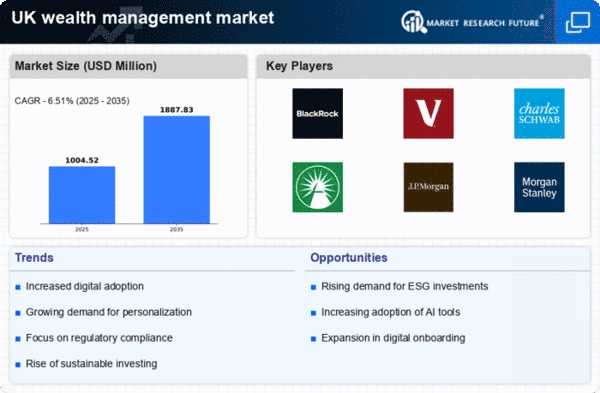Evolving Regulatory Landscape
The evolving regulatory landscape in the UK significantly impacts the wealth management-platform market. Regulatory bodies are increasingly emphasizing compliance, transparency, and consumer protection, which necessitates that wealth management platforms adapt their operations accordingly. Recent regulations, such as the Financial Services Act, have introduced stricter guidelines for financial advisors and wealth managers, compelling firms to enhance their compliance frameworks. This shift creates both challenges and opportunities within the industry. While compliance may increase operational costs, it also fosters trust and credibility among clients, which can lead to increased client retention and acquisition. As firms navigate this complex regulatory environment, the wealth management-platform market must prioritize compliance as a core component of their business strategy to thrive in a competitive landscape.
Growing Affluence of Consumers
The increasing affluence of consumers in the UK is a pivotal driver for the wealth management-platform market. As disposable incomes rise, more individuals seek sophisticated financial services to manage their wealth effectively. Recent data indicates that the number of high-net-worth individuals (HNWIs) in the UK has surged, with estimates suggesting a growth of approximately 5% annually. This demographic shift compels wealth management platforms to innovate and tailor their offerings to meet the diverse needs of affluent clients. Furthermore, as wealth becomes more concentrated, the demand for personalized investment strategies and financial planning services intensifies, thereby propelling the growth of the wealth management-platform market. The industry must adapt to these changing consumer profiles, ensuring that platforms are equipped to provide bespoke solutions that resonate with the evolving expectations of a wealthier clientele.
Demographic Shifts and Aging Population
Demographic shifts, particularly the aging population in the UK, are driving changes in the wealth management-platform market. As the population ages, there is a growing need for retirement planning and wealth preservation strategies. The Office for National Statistics indicates that by 2030, nearly 25% of the UK population will be over 65 years old, creating a substantial market for wealth management services tailored to older clients. This demographic is often seeking advice on estate planning, tax efficiency, and long-term investment strategies. Wealth management platforms must adapt their services to cater to the unique needs of this aging demographic, ensuring that they provide relevant and accessible solutions. As this trend continues, the wealth management-platform market is poised for growth, driven by the increasing demand for specialized services that address the financial concerns of an older population.
Increased Demand for Sustainable Investment
The growing demand for sustainable investment options is a notable driver in the wealth management-platform market. UK investors are increasingly prioritizing environmental, social, and governance (ESG) factors when making investment decisions. This shift is reflected in the rising popularity of ESG-focused funds, which have seen inflows exceeding £10 billion in recent years. Wealth management platforms are responding to this trend by integrating sustainable investment options into their offerings, thereby appealing to a broader client base. As awareness of climate change and social responsibility continues to rise, the wealth management-platform market is likely to see an expansion in products that align with these values. This evolution not only meets client expectations but also positions firms as leaders in responsible investing, potentially enhancing their market share and reputation.
Technological Advancements in Financial Services
Technological advancements are reshaping the landscape of the wealth management-platform market. The integration of cutting-edge technologies such as blockchain, artificial intelligence, and machine learning is enhancing operational efficiencies and client experiences. For instance, platforms that leverage AI can analyze vast datasets to provide personalized investment recommendations, thereby improving client engagement. The UK market has witnessed a notable increase in the adoption of these technologies, with reports indicating that over 60% of wealth management firms are investing in digital transformation initiatives. This trend not only streamlines processes but also fosters greater transparency and trust among clients. As technology continues to evolve, the wealth management-platform market is likely to experience further disruption, compelling firms to innovate continuously to stay competitive and meet the demands of tech-savvy investors.
















